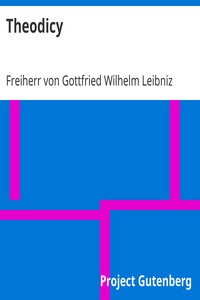Theodicy: Essays on the Goodness of God, the Freedom of Man and the Origin of Evil
Author: Leibniz, Gottfried Wilhelm, Freiherr von
Bookshelves: Philosophy & Ethics, Religion/Spirituality/Paranormal, Category: Philosophy & Ethics, Category: Religion/Spirituality

Summary
"Theodicy" by G.W. Leibniz is a philosophical treatise written in the early 18th century. This work explores the relationship between divine goodness, human freedom, and the existence of evil, presenting arguments aimed at reconciling the apparent contradictions in these concepts. The book represents Leibniz's significant contribution to metaphysics and theology, particularly in understanding the nature of God and the moral order of the universe. The opening of the work sets the stage for a rich exploration of these themes, framing the discussion in the context of theological debates of the time. The introduction touches on Leibniz's philosophical foundations, emphasizing his metaphysical approach that strives to unify various aspects of human experience under a coherent system. It highlights his criticisms of contemporary philosophical positions, especially Cartesian dualism, while positioning his unique concept of pre-established harmony, which suggests a divinely ordained synchronicity among created beings and their experiences. This introduction serves as a gateway to the deeper inquiries that Leibniz poses throughout the text regarding the implications of free will, the nature of good and evil, and God's role in human affairs. (This is an automatically generated summary.)
 LibraryManager
LibraryManager